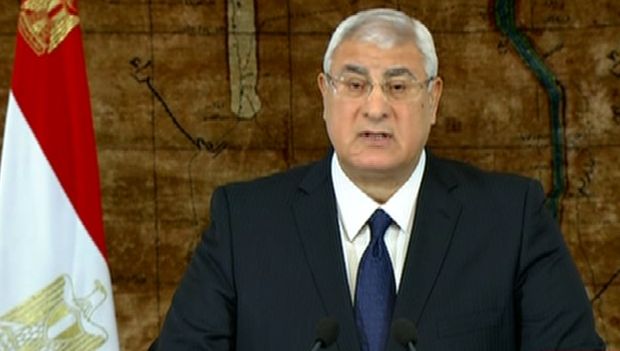
In this image made from video broadcast on Egyptian State Television, Egypt’s interim President Adly Mansour speaks at the presidential palace in Cairo, Egypt, Sunday, Jan. 26, 2014. (AP Photo/Egyptian State Television)
Parliamentary elections were due to take place before the country elected a president under the timetable agreed for the country’s military-backed roadmap following former president Mohamed Mursi’s ouster in July.
However, Mansour announced during a televised speech to the nation that he had “held a number of discussions with political parties and representatives of various movements and sectors of society about the reordering of the roadmap,” and that these discussions resulted in “a request by the majority to make the presidential elections the second priority in the roadmap following your ratification of Egypt’s new constitution, and for the parliamentary elections to come third.”
He said he had now tasked the country’s High Elections Commission to open registration for presidential candidates, and that he would make the necessary legislative amendments to laws governing presidential elections in the next few days “in accordance with the constitution.”
The country’s new constitution, which was approved earlier this month during a two-day poll which saw 38.6 percent of the country’s eligible voters take partᰬ98.1 percent of whom voted yes to the new constitution—leaves open the question of which of the two polls, presidential or parliamentary, should come first.
In response to the series of terrorist attacks that killed 20 soldiers and police officers over the past few days, Mansour said: “We will not hesitate to take the exceptional measures needed if the situation required, and I want the world to know the facts of what is happening in Egypt. And to all those who do not comprehend or pretend not to comprehend, we will preserve the safety and security of this country and its people, and we will assume all our responsibilities to achieve security and stability in this country.”
Four bombs exploded in the center of Cairo on Friday targeting police and killing six people. Sinai-based militant group Ansar Bait Al-Maqdis claimed it was responsible for the attacks, as well as for the shooting down of an army helicopter on Saturday in the northern Sinai Peninsula.
Addressing the perpetrators of the attacks, Mansour said: “Your appalling actions will not achieve your aims, and I assure you that the will of the Egyptians will not be broken, they will become stronger and more unified. And we are intent as a state and people, on extracting your terrorism from its roots and intent on implementing the roadmap.”
Mansour said he urged the prosecution to expedite the legal process in order to ensure justice was served. Izzat Khamis, a spokesman for the Justice Ministry, told Asharq Al-Awsat on Sunday: “There are six judicial authorities—actively set to look into these cases linked to terrorist acts—which have started their work.”
In an attempt to reduce tension between the country’s young activists and the government, Mansour said he had urged the prosecutor-general to “look into the cases of detainees, especially university students, in order to release anyone who was not proven to have committed any crimes.”
A number of Egypt’s prominent activists, including founding members of the April 6 Movement, one of the galvanizing forces of the country’s January 25 revolution which toppled former president Hosni Mubarak in 2011, have recently been arrested and imprisoned.
Following Mansour’s speech, spokesman for the presidency, Ambassador Ehab Badawi, said that by using the term detainees, the president meant those detained for questioning, according to legal procedures. He added: “There are no detainees in the meaning of the term as explained by the emergency law, and there are no administrative detainees in Egyptian prisons.”
Meanwhile, Abdel-Jalil Mostafa, a leading figure in the Committee of 50, which drafted the country’s new constitution, welcomed Mansour’s speech and said that bringing forward the date of the presidential elections was expected and was a response to demands of political parties. He added that the move came at the right time.
Mostafa told Asharq Al-Awsat: “The review of the legal standings of the detained youth, especially university students, was an issue we had demanded for some time now, and the response was welcome, even if we hoped it had come earlier.”
Hassan Nafaa, political science lecturer at Cairo University, said the amendment of the roadmap and starting with the presidential elections meant that Sisi had decided to run for the presidency.
Nafaa told Asharq Al-Awsat on Sunday that “had the issue not been related to Sisi’s candidacy, there would have been no need for the amendment.” Nafaa urged the government to try to contain the Islamist youth to avoid pushing them to join organizations linked to Al-Qaeda.
On Monday, the presidency announced that Mansour had issued a presidential decree promoting Sisi to field marshal, the highest rank in the military. Military personnel are barred from running for the presidency, according to Egyptian law, leading to speculation that the promotion is a final gesture of respect for Sisi before he retires from the military and enters politics, or an attempt to burnish his image in the run-up to the election.
